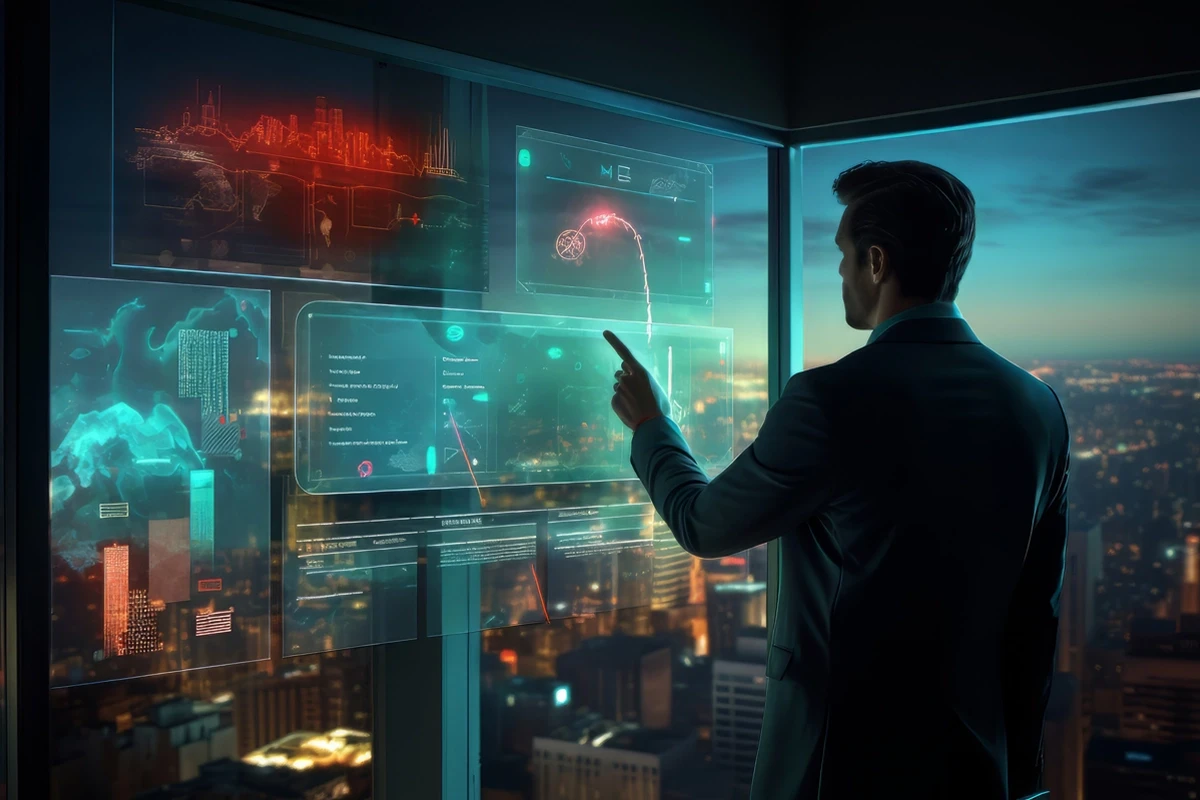Top Most Use Cases of Real-World Asset Tokenization
May 17, 2024



The emergence of real-world asset tokenization is completely changing how we finance, invest, and manage assets. This innovation enables the transformation of material and immaterial assets into digital tokens for blockchain exchange. Tokenization is a process that transforms old procedures into more accessible, efficient, and transparent ones by dividing complicated assets into tradable digital parts. This creates intriguing new prospects across a variety of sectors.
Imagine accessing a fraction of the capital typically needed to engage in private equity, fine art, or real estate. Thanks to tokenization, which permits fractional ownership, smaller investors can now access markets that were previously inaccessible. Real-world asset tokenization, bolstered by blockchain development, democratizes access to high-value assets, improves transaction security, lowers costs, and streamlines asset administration. With continued use, this technology can completely change the financial landscape and create a more productive and equitable economic environment.
Use Cases of Real-World Asset Tokenization

Real Estate Tokenization
Real estate is one of the globe's most essential and stable assets, but its inherent illiquidity poses challenges for speedy transactions. Enter tokenization.
Imagine breaking down actual property possession into tradable fragments, enabling traders to buy and promote smaller quantities of properties. This no longer democratizes real property investment; however, it also empowers smaller buyers who lack the right to enter whole residences earlier than before.
Moreover, real property tokenization streamlines asset management and investment. Automated leases, effortless investor tracking, and green control should redefine the estate panorama. But before delving in, knowledge of asset tokenization rules is crucial.
Private Equity Potential
Private equity, recognized for its capacity profitability but inherent threat and illiquidity, unearths a compelling use case in RWA tokenization.
Fractional token ownership broadens the right to enter this asset's magnificence, opening doors for smaller traders. Additionally, tokenization streamlines the sale of personal equity investments, improving marketplace efficiency. Picture tokenized property buying and selling on exchanges, simplifying transactions for investors.
Revolutionizing Fine Art Investment
Fine art, worth over $1.7 trillion, has traditionally been an extraordinary market because of its illiquidity and opacity. Tokenization may want to rework this landscape significantly.
Tokenizing first-rate art allows fractionalized possession, welcoming smaller traders into this elite sphere. Furthermore, it can streamline artwork authentication and control via embedding tokens in music ownership and provenance.
Transforming Trade Finance
Trade finance, pivotal within the world financial system but plagued by inefficiencies and fraud, can gain significantly from tokenization.
Automated, blockchain-settled transactions should revolutionize finance, offering velocity and protection while decreasing expenses and office work. Additionally, stepped-forward tracking and control ought to combat fraud, improving marketplace performance.
Carbon Credits Tokenization
Carbon credits, representing reductions in greenhouse fuel emissions, are critical in emission guidelines and offsetting.
Tokenizing carbon credits should establish a more significant liquid marketplace, simplify transactions and decrease compliance prices. Moreover, it can streamline monitoring and usage, ensuring these credits satisfy their intended motive while minimizing fraud.
Intellectual Property Rights Tokenization
Tokenizing highbrow property rights opens doorways to broader accessibility for creative assets. By converting these rights into virtual tokens, creators have the advantage of empowerment, even by improving marketplace transparency and accessibility. This transformation may want to revolutionize how highbrow property is sold, bought, and utilized, fostering extra inclusive surroundings for creators.
Agriculture Commodities Tokenization
Tokenization of the agricultural sector enables streamlined buying and selling of commodities through fractional ownership. This shift ought to optimize the sector's efficiency by permitting more accessible access to agricultural investments. Fractional ownership ought to democratize access, inviting smaller buyers into this historically specific domain and fostering boom and innovation.
Tokenizing Music Royalties
Tokenizing music royalties signifies a game-changer for the song enterprise. It democratizes access to those sales, reaping benefits for artists and traders. Through tokenization, artists benefit from a new way to monetize their paintings while buyers gain entry to a previously elusive asset class. This method complements royalty control transparency, ensuring fair compensation for artists.
Conclusion
Real-world asset tokenization development represents a transformative innovation with various impactful applications throughout numerous sectors. From revolutionizing actual property funding and personal equity, getting the right of entry to reworking excellent artwork markets, exchange finance, carbon credits, highbrow belongings rights, agriculture commodities, and tune royalties, tokenization offers a gateway to extra liquidity, accessibility, and transparency. By breaking down traditional barriers and democratizing entry to previously exclusive asset classes, tokenization paves the way for a more inclusive and efficient economic ecosystem.
As this technology continues to conform and gain traction, its capacity to reshape investment, financing, and asset control is boundless, heralding a new generation of opportunity and overall performance in the world economic system. At DecentraBlock, we're at the vanguard of real-world asset tokenization development, driving innovation and growing solutions that enhance the performance and accessibility of numerous asset markets. Based on our information on blockchain development, DecentraBlock is dedicated to maintaining the charge towards an extra-democratised and green financial landscape.
The emergence of real-world asset tokenization is completely changing how we finance, invest, and manage assets. This innovation enables the transformation of material and immaterial assets into digital tokens for blockchain exchange. Tokenization is a process that transforms old procedures into more accessible, efficient, and transparent ones by dividing complicated assets into tradable digital parts. This creates intriguing new prospects across a variety of sectors.
Imagine accessing a fraction of the capital typically needed to engage in private equity, fine art, or real estate. Thanks to tokenization, which permits fractional ownership, smaller investors can now access markets that were previously inaccessible. Real-world asset tokenization, bolstered by blockchain development, democratizes access to high-value assets, improves transaction security, lowers costs, and streamlines asset administration. With continued use, this technology can completely change the financial landscape and create a more productive and equitable economic environment.
Use Cases of Real-World Asset Tokenization

Real Estate Tokenization
Real estate is one of the globe's most essential and stable assets, but its inherent illiquidity poses challenges for speedy transactions. Enter tokenization.
Imagine breaking down actual property possession into tradable fragments, enabling traders to buy and promote smaller quantities of properties. This no longer democratizes real property investment; however, it also empowers smaller buyers who lack the right to enter whole residences earlier than before.
Moreover, real property tokenization streamlines asset management and investment. Automated leases, effortless investor tracking, and green control should redefine the estate panorama. But before delving in, knowledge of asset tokenization rules is crucial.
Private Equity Potential
Private equity, recognized for its capacity profitability but inherent threat and illiquidity, unearths a compelling use case in RWA tokenization.
Fractional token ownership broadens the right to enter this asset's magnificence, opening doors for smaller traders. Additionally, tokenization streamlines the sale of personal equity investments, improving marketplace efficiency. Picture tokenized property buying and selling on exchanges, simplifying transactions for investors.
Revolutionizing Fine Art Investment
Fine art, worth over $1.7 trillion, has traditionally been an extraordinary market because of its illiquidity and opacity. Tokenization may want to rework this landscape significantly.
Tokenizing first-rate art allows fractionalized possession, welcoming smaller traders into this elite sphere. Furthermore, it can streamline artwork authentication and control via embedding tokens in music ownership and provenance.
Transforming Trade Finance
Trade finance, pivotal within the world financial system but plagued by inefficiencies and fraud, can gain significantly from tokenization.
Automated, blockchain-settled transactions should revolutionize finance, offering velocity and protection while decreasing expenses and office work. Additionally, stepped-forward tracking and control ought to combat fraud, improving marketplace performance.
Carbon Credits Tokenization
Carbon credits, representing reductions in greenhouse fuel emissions, are critical in emission guidelines and offsetting.
Tokenizing carbon credits should establish a more significant liquid marketplace, simplify transactions and decrease compliance prices. Moreover, it can streamline monitoring and usage, ensuring these credits satisfy their intended motive while minimizing fraud.
Intellectual Property Rights Tokenization
Tokenizing highbrow property rights opens doorways to broader accessibility for creative assets. By converting these rights into virtual tokens, creators have the advantage of empowerment, even by improving marketplace transparency and accessibility. This transformation may want to revolutionize how highbrow property is sold, bought, and utilized, fostering extra inclusive surroundings for creators.
Agriculture Commodities Tokenization
Tokenization of the agricultural sector enables streamlined buying and selling of commodities through fractional ownership. This shift ought to optimize the sector's efficiency by permitting more accessible access to agricultural investments. Fractional ownership ought to democratize access, inviting smaller buyers into this historically specific domain and fostering boom and innovation.
Tokenizing Music Royalties
Tokenizing music royalties signifies a game-changer for the song enterprise. It democratizes access to those sales, reaping benefits for artists and traders. Through tokenization, artists benefit from a new way to monetize their paintings while buyers gain entry to a previously elusive asset class. This method complements royalty control transparency, ensuring fair compensation for artists.
Conclusion
Real-world asset tokenization development represents a transformative innovation with various impactful applications throughout numerous sectors. From revolutionizing actual property funding and personal equity, getting the right of entry to reworking excellent artwork markets, exchange finance, carbon credits, highbrow belongings rights, agriculture commodities, and tune royalties, tokenization offers a gateway to extra liquidity, accessibility, and transparency. By breaking down traditional barriers and democratizing entry to previously exclusive asset classes, tokenization paves the way for a more inclusive and efficient economic ecosystem.
As this technology continues to conform and gain traction, its capacity to reshape investment, financing, and asset control is boundless, heralding a new generation of opportunity and overall performance in the world economic system. At DecentraBlock, we're at the vanguard of real-world asset tokenization development, driving innovation and growing solutions that enhance the performance and accessibility of numerous asset markets. Based on our information on blockchain development, DecentraBlock is dedicated to maintaining the charge towards an extra-democratised and green financial landscape.
The emergence of real-world asset tokenization is completely changing how we finance, invest, and manage assets. This innovation enables the transformation of material and immaterial assets into digital tokens for blockchain exchange. Tokenization is a process that transforms old procedures into more accessible, efficient, and transparent ones by dividing complicated assets into tradable digital parts. This creates intriguing new prospects across a variety of sectors.
Imagine accessing a fraction of the capital typically needed to engage in private equity, fine art, or real estate. Thanks to tokenization, which permits fractional ownership, smaller investors can now access markets that were previously inaccessible. Real-world asset tokenization, bolstered by blockchain development, democratizes access to high-value assets, improves transaction security, lowers costs, and streamlines asset administration. With continued use, this technology can completely change the financial landscape and create a more productive and equitable economic environment.
Use Cases of Real-World Asset Tokenization

Real Estate Tokenization
Real estate is one of the globe's most essential and stable assets, but its inherent illiquidity poses challenges for speedy transactions. Enter tokenization.
Imagine breaking down actual property possession into tradable fragments, enabling traders to buy and promote smaller quantities of properties. This no longer democratizes real property investment; however, it also empowers smaller buyers who lack the right to enter whole residences earlier than before.
Moreover, real property tokenization streamlines asset management and investment. Automated leases, effortless investor tracking, and green control should redefine the estate panorama. But before delving in, knowledge of asset tokenization rules is crucial.
Private Equity Potential
Private equity, recognized for its capacity profitability but inherent threat and illiquidity, unearths a compelling use case in RWA tokenization.
Fractional token ownership broadens the right to enter this asset's magnificence, opening doors for smaller traders. Additionally, tokenization streamlines the sale of personal equity investments, improving marketplace efficiency. Picture tokenized property buying and selling on exchanges, simplifying transactions for investors.
Revolutionizing Fine Art Investment
Fine art, worth over $1.7 trillion, has traditionally been an extraordinary market because of its illiquidity and opacity. Tokenization may want to rework this landscape significantly.
Tokenizing first-rate art allows fractionalized possession, welcoming smaller traders into this elite sphere. Furthermore, it can streamline artwork authentication and control via embedding tokens in music ownership and provenance.
Transforming Trade Finance
Trade finance, pivotal within the world financial system but plagued by inefficiencies and fraud, can gain significantly from tokenization.
Automated, blockchain-settled transactions should revolutionize finance, offering velocity and protection while decreasing expenses and office work. Additionally, stepped-forward tracking and control ought to combat fraud, improving marketplace performance.
Carbon Credits Tokenization
Carbon credits, representing reductions in greenhouse fuel emissions, are critical in emission guidelines and offsetting.
Tokenizing carbon credits should establish a more significant liquid marketplace, simplify transactions and decrease compliance prices. Moreover, it can streamline monitoring and usage, ensuring these credits satisfy their intended motive while minimizing fraud.
Intellectual Property Rights Tokenization
Tokenizing highbrow property rights opens doorways to broader accessibility for creative assets. By converting these rights into virtual tokens, creators have the advantage of empowerment, even by improving marketplace transparency and accessibility. This transformation may want to revolutionize how highbrow property is sold, bought, and utilized, fostering extra inclusive surroundings for creators.
Agriculture Commodities Tokenization
Tokenization of the agricultural sector enables streamlined buying and selling of commodities through fractional ownership. This shift ought to optimize the sector's efficiency by permitting more accessible access to agricultural investments. Fractional ownership ought to democratize access, inviting smaller buyers into this historically specific domain and fostering boom and innovation.
Tokenizing Music Royalties
Tokenizing music royalties signifies a game-changer for the song enterprise. It democratizes access to those sales, reaping benefits for artists and traders. Through tokenization, artists benefit from a new way to monetize their paintings while buyers gain entry to a previously elusive asset class. This method complements royalty control transparency, ensuring fair compensation for artists.
Conclusion
Real-world asset tokenization development represents a transformative innovation with various impactful applications throughout numerous sectors. From revolutionizing actual property funding and personal equity, getting the right of entry to reworking excellent artwork markets, exchange finance, carbon credits, highbrow belongings rights, agriculture commodities, and tune royalties, tokenization offers a gateway to extra liquidity, accessibility, and transparency. By breaking down traditional barriers and democratizing entry to previously exclusive asset classes, tokenization paves the way for a more inclusive and efficient economic ecosystem.
As this technology continues to conform and gain traction, its capacity to reshape investment, financing, and asset control is boundless, heralding a new generation of opportunity and overall performance in the world economic system. At DecentraBlock, we're at the vanguard of real-world asset tokenization development, driving innovation and growing solutions that enhance the performance and accessibility of numerous asset markets. Based on our information on blockchain development, DecentraBlock is dedicated to maintaining the charge towards an extra-democratised and green financial landscape.

DecentraBlock is at the forefront of blockchain innovation, revolutionizing how businesses secure, transact, and grow in the digital age. Join us on a journey to harness the full potential of decentralized technology for a more efficient and transparent future.
Services
Subscribe to Our Newsletter
Get the latest news, updates, and insights on blockchain technology directly to your inbox. Sign up for our newsletter today!
© 2024 DecentraBlock. All rights reserved.

DecentraBlock is at the forefront of blockchain innovation, revolutionizing how businesses secure, transact, and grow in the digital age. Join us on a journey to harness the full potential of decentralized technology for a more efficient and transparent future.
Services
Subscribe to Our Newsletter
Get the latest news, updates, and insights on blockchain technology directly to your inbox. Sign up for our newsletter today!
© 2024 DecentraBlock. All rights reserved.

DecentraBlock is at the forefront of blockchain innovation, revolutionizing how businesses secure, transact, and grow in the digital age. Join us on a journey to harness the full potential of decentralized technology for a more efficient and transparent future.
Services
Subscribe to Our Newsletter
Get the latest news, updates, and insights on blockchain technology directly to your inbox. Sign up for our newsletter today!
© 2024 DecentraBlock. All rights reserved.


